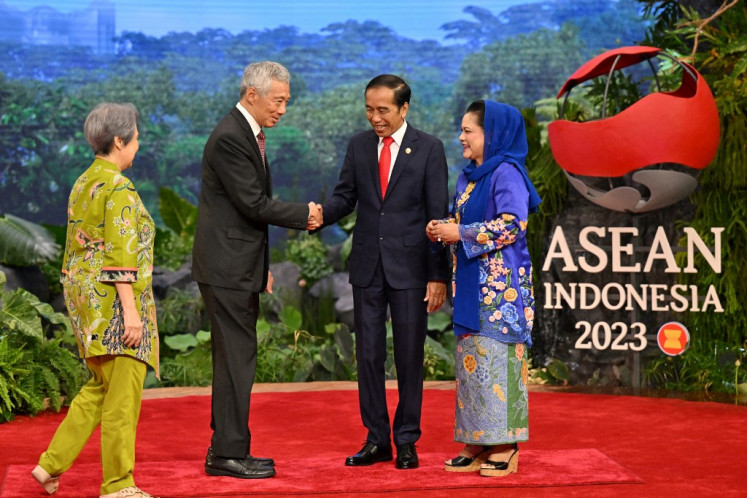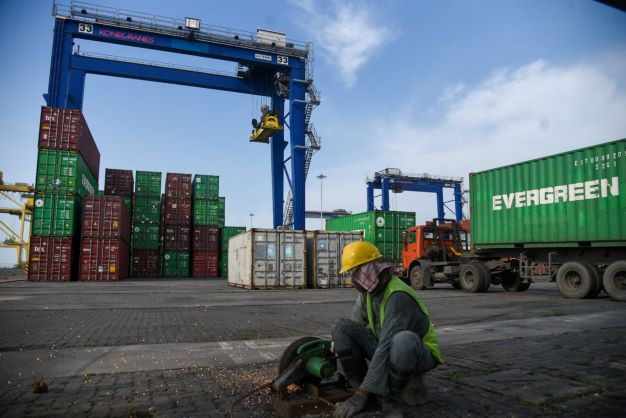Biodiesel plan set to help rupiah
The government is preparing a plan to expand the use of biodiesel in a bid to reduce imports of fuel as part of the measures to save the rupiah from depreciating further
Change Size

T
he government is preparing a plan to expand the use of biodiesel in a bid to reduce imports of fuel as part of the measures to save the rupiah from depreciating further.
During a Cabinet meeting on Tuesday, President Joko “Jokowi” Widodo said Indonesia was in dire need of more foreign exchange supplies to reduce rupiah depreciation and safeguard the economy.
“The country needs dollars right now, so I want all ministries and institutions to be serious in facing this condition. I do not want a lot of meetings with sluggish implementation,” he said at the State Palace in Bogor, West Java.
Jokowi will soon sign a presidential regulation (Perpres) to allow the expanded implementation of 20 percent biodiesel mix (B20) in both subsidized and non-subsidized diesel fuel. Currently, the implementation is only for subsidized diesel fuel, commonly known as Solar, a product marketed by state-owned energy giant Pertamina.
“The Perpres [draft] has been completed; it only needs to be signed and launched by the President. I hope it can be done this month,” said Coordinating Economic Minister Darmin Nasution.
Darmin said the expansion of B20 implementation would save Indonesia’s budget at around 3.5 million kiloliters (kl) to 4.5 million kl of fuel imports per year. Lesser fuel imports would reduce Indonesia’s current account deficit.
The government has also been calling for big conglomerates to place all export revenue in domestic banks and convert it to rupiah. The government claimed that of all export proceeds coming back to Indonesia, only 80 percent was converted to rupiah, while the remaining 20 percent remained in United States dollars.
Darmin said exporters were still placing 20 percent of all export revenue in US dollars to pay debts and buy raw materials, adding that the government was still mulling over an idea to make all export revenue parked in Indonesia and converted to rupiah.
“They [exporters] put some of the revenue in US dollar accounts, and banks cannot easily convert the funds into rupiah-denominated loans,” he said. “For now, the solution is to create a cheaper currency-swap mechanism so exporters can borrow money in rupiah despite having [US] dollar savings accounts.”
Since February, the rupiah has been weakening against the greenback as the Federal Reserve gradually raised its funds rate amid better economic prospects in the US, while US President Donald Trump continues to escalate his trade war against China and other countries.
The rupiah was at Rp 13,300 per US dollar in February, but gradually weakened and now hovers at around Rp 14,400 to Rp 14,500 per US dollar.
Last week, the government floated the idea of removing the domestic market obligation (DMO) regulation in the coal mining sector as part of the efforts to reduce rupiah depreciation. The rule obliges coal miners to sell 25 percent of their production to state electricity company PLN with the price capped at US$70 per ton.
However, in a Tuesday Cabinet meeting, Jokowi decided to cancel the revocation plan following rising public criticism that a removal of DMO policy could potentially increase electricity costs, which would burden a lot of people.
On a separate occasion in Jakarta on Tuesday, the Financial System Stability Committee (KSSK) stated that the country’s fundamentals in economy and monetary systems remained safeguarded despite heavy rupiah depreciation.
Finance Minister Sri Mulyani Indrawati, who is also the KSSK’s chairwoman, said regardless of the economic challenges Indonesia faced right now, it still fared better in terms of currency depreciation than other emerging economies like the Philippines, India, South Africa, Brazil and Turkey.
“Taking into account the economic development [from the beginning of the year] until July 20, 2018, the KSSK has concluded that the stability of the monetary system of the second quarter this year has been well maintained among the escalating global threats,” Sri Mulyani said in a press conference.
She said an earlier instruction from Jokowi to reduce “strategic imports” to help maintain the currency meant that the President was expecting the B20 regulation to be implemented immediately in a wider move to reduce fuel imports.
Piter Abdullah, research director of the Center of Reform on Economics (CORE) Indonesia, said on a separate occasion that, despite the fact that the government and Bank Indonesia (BI) had been anticipating currency weakening, the rupiah kept depreciating due to uncertainties stemming from trade tensions between the US and its trade partners.









